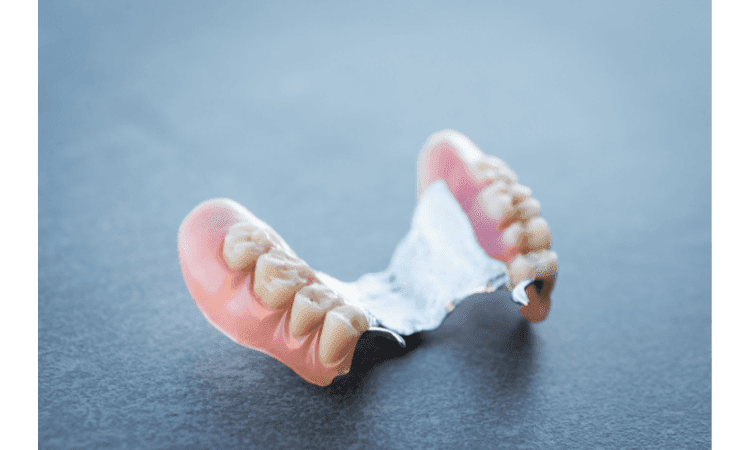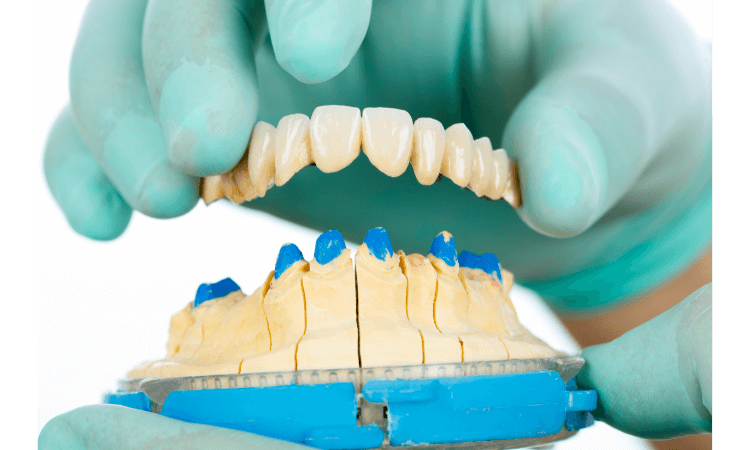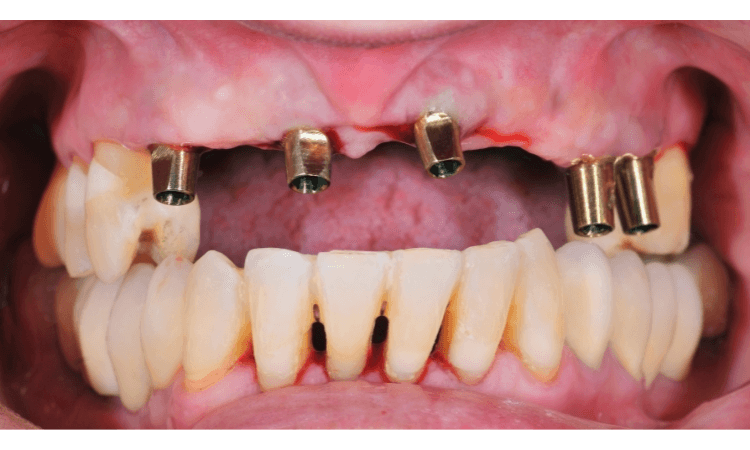
Losing a tooth can be a difficult and traumatic experience, and it’s natural to want to restore your smile as quickly as possible. Teeth replacement options like dentures, bridges, and implants can not only improve the appearance of your smile but also bring back the function and confidence you had with your natural teeth. In this blog, we’ll explore the many reasons why teeth replacement is worth the investment. From improving your oral health and preventing bone loss to increasing your self-esteem and ability to eat the foods you love, the benefits of teeth replacement are numerous. We’ll also discuss the different types of teeth replacement options available, and how to make sure you choose the best option for you. Whether you’re missing one tooth or all of your teeth, this blog will help you understand the many benefits of teeth replacement and how it can improve your quality of life.

You are probably wondering why anyone would want to replace their teeth. There are plenty of reasons why you would want to do this. Beauty is a big reason a lot of people buy these new teeth, but these can be used for more than that too. If you are missing teeth for some reason, you could use them to replace them and fix your smile instead of hiding it in your mouth.
Why replace teeth?

There are a number of reasons why it’s important to replace missing teeth. Here are a few of the most significant:
- Oral health: Missing teeth can cause a domino effect of oral health problems. The remaining teeth may shift out of place, leading to bite misalignment and an increased risk of tooth decay and gum disease. Replacing missing teeth can help to prevent these problems and maintain the overall health of your mouth.
- Bone loss: When a tooth is missing, the bone in the jaw that previously supported it begins to shrink. This process, called bone resorption, can cause the jawbone to weaken and change shape over time. Implants are the only option that can help to stop or even reverse this process, by mimicking the tooth root and stimulating the bone.
- Eating and speaking: Missing teeth can make it difficult to bite and chew food properly, which can lead to digestive problems. It also can affect the way you speak, causing you to slur your words or lisp. Teeth replacement can restore your ability to eat and speak comfortably and confidently.
- Self-esteem and confidence: Having missing teeth can be embarrassing and affect your self-esteem. With replacement teeth that look and function like natural teeth, you can enjoy smiling, laughing and talking with others without feeling self-conscious.
- Aesthetics: Having missing teeth can be unsightly, making the smile look incomplete. Replacement teeth can improve the appearance of your smile and enhance the overall aesthetic of your face.
It’s important to note that different replacement options come with different benefits and downsides. Dentures are removable, bridges are fixed but require to sacrifice surrounding teeth, while implants are permanent but with a high cost, it’s important to consult a dental professional to determine the best option for you based on your budget, lifestyle, and dental history.
There are many options to replace your teeth.
There are several options available for replacing missing teeth, each with its own set of benefits and drawbacks. Some of the most common options include:
- Dentures: Dentures are removable prosthetic devices that replace multiple missing teeth. They are typically made of acrylic and can be customized to fit the patient’s mouth. Dentures can be full or partial, depending on the number of teeth that need to be replaced. Dentures are the most affordable option for teeth replacement, but they may not be as stable as other options, they may shift around in the mouth, cause sore spots, and don’t prevent bone loss.
- Bridges: A bridge is a fixed prosthetic device that is anchored to the patient’s existing teeth or dental implants. It replaces one or more missing teeth by using the adjacent teeth as anchors. Bridges are not removable, but they do require the sacrifice of the surrounding teeth, which need to be grind down to support the bridge. It can be less comfortable than other options and can also cause problems to the surrounding teeth if not well maintained.

3. Dental Implants: Implants are small, artificial tooth roots that are surgically placed into the jawbone to support a replacement tooth. They can be used to replace one or more missing teeth and are considered the most permanent and natural-looking option. They are also the best solution to stop bone loss, they don’t affect the surrounding teeth and they are stable and comfortable, but they are also the most expensive option.

4. Implant-supported dentures: An implant-supported denture is a type of denture that is secured to the jawbone with the help of one or more dental implants. This option is more stable and comfortable than traditional dentures and can help to prevent bone loss. They are also more expensive than traditional dentures.
It’s important to note that the choice of the best option for you depends on factors such as the number of missing teeth, the location of the missing teeth, the health of your jawbone, and your budget. It’s recommended to consult with a dental professional to determine the best teeth replacement option for your individual needs and preferences.
The latest in teeth replacement technology

The latest in teeth replacement technology will allow you to have a new smile that looks and feels like the real thing. This can be a great option for those who are looking to improve their smile. Technology is constantly improving, so there are more options available now than ever before.
There are several different types of dental implants available. The first type is known as endosseous implant dentistry. When this type of implant is used, it will go through the gum line and into the jawbone. It will then be secured into place by screwing it down into the bone. This keeps it firmly in place while allowing you to eat, talk and smile without any issues.
The second type of implant uses what is called an osseointegrated implant dentistry technique. This type of implant is similar to an endosseous implant, but instead of going through the gum line and into the jawbone, it goes through just under your gumline and into your jawbone where it is secured with a screw in order to keep it firmly in place while allowing you to eat, talk and smile without any issues whatsoever.
Both of these types of implants are considered very strong options because they are able to withstand some pretty heavy wear and tear over time.
Cost of teeth replacement
The cost of teeth replacement can vary widely depending on the type of replacement option you choose, the number of teeth being replaced, and where you live. Here’s a general overview of the costs associated with some of the most common teeth replacement options:
- Dentures: The cost of dentures can vary widely depending on the type of denture and the materials used. A basic acrylic full denture can cost anywhere from $300 to $3,000. A more advanced option like a flexible denture can cost between $800 and $4,000.
- Bridges: The cost of bridges depends on the type of bridge and the materials used. A traditional bridge can cost between $1,500 and $4,000 for one missing tooth. A resin-bonded bridge or a cantilever bridge may be less expensive, with costs between $1,000 and $3,000.
- Dental Implants: The cost of dental implants can range from $1,500 to $6,000 or more for a single implant, depending on factors such as the type of implant and the location of the dental practice. This cost includes the surgical placement of the implant, as well as the cost of the abutment and the replacement tooth.
- Implant-Supported Dentures: Implant-supported dentures can cost between $7,000 and $25,000 or more, depending on the number of implants required and the type of denture used.
It’s important to note that cost varies significantly based on location, and that these estimates are subject to change. The cost also may be affected by the type of insurance and the dental coverage you have. Some insurances cover certain teeth replacement options more than others, so it’s important to check with your insurance company about the coverage options for the treatment you’re considering.
It’s also worth considering that some of the teeth replacement options have a life time of many years, so the cost should be looked at not only as a one time expense, but also as a long-term investment. Consulting with a dental professional and discussing the cost and benefits of different options can help you make an informed decision that is best for your budget, lifestyle and health.
There are two main factors that affect the length of time it takes to get dental implants:
- The number of teeth involved
- Your general health
The average time for a single tooth implant is approximately six months. This includes the time that you will be in the dental chair for your surgery, as well as the healing period after your surgery. If you need more than one implant, then the healing process will take longer because there are more wounds to heal at once. If you have any other health problems, such as diabetes or heart disease, it may take longer for your body to recover from surgery and heal properly.
Is there a lot of pain?

The treatment for implants is painless. You will have to take some antibiotics for about a week before surgery, but after that, you can resume normal activities.
You may experience some soreness during the first week or so after surgery, but this should subside quickly. You may also experience mild swelling in the area of your mouth where the incision was made.
It’s important to remember that implants are not permanent solutions for missing teeth. They are meant to replace one tooth at a time and must be replaced every 10-15 years (the average lifespan of a natural tooth). If you lose an implant, it can be replaced with another implant or a bridge or denture (partially or fully).
How long do they last?
The lifespan of replaced teeth depends on the type of replacement option chosen, as well as factors such as oral hygiene, diet, and overall health. Here’s a general overview of how long different types of replaced teeth can last:
- Dentures: The lifespan of dentures can vary depending on the type of denture and the materials used. A basic acrylic denture can last from 5 to 7 years. A more advanced option like a flexible denture can last up to 10 years. However, regular adjustment and relining are needed to maintain a comfortable fit, and eventually, the dentures will need to be replaced entirely.
- Bridges: The lifespan of bridges can vary depending on the type of bridge and the materials used. A traditional bridge can last anywhere from 5 to 15 years. A resin-bonded bridge or a cantilever bridge may have a shorter lifespan, typically between 5 to 7 years. Bridges require regular checkups and maintenance, and eventually, they will need to be replaced.
- Dental Implants: Dental implants are considered a permanent solution, they can last a lifetime with proper care and maintenance. The implant itself is made of titanium and is designed to fuse with the jawbone, becoming a permanent part of the mouth. The replacement tooth, or the crown, that sits on top of the implant can last anywhere from 5 to 15 years and would need to be replaced after that.
- Implant-Supported Dentures: The lifespan of implant-supported dentures can vary depending on the number of implants and the type of denture used. They can last anywhere from 5 to 15 years, but the implant will last a lifetime. The denture can require maintenance and adjustment over time, and eventually will need to be replaced.
It’s important to note that all these options require regular check-ups and good oral hygiene to last as long as possible. Smoking and unhealthy habits like poor diet and lack of oral hygiene can decrease the lifespan of replaced teeth. Additionally, it’s important to have regular follow-up visits with a dental professional, as well as to attend any recommended maintenance or replacement appointments, to ensure your replaced teeth continue to function well and last as long as possible.
Conclusion
In conclusion, teeth replacement is a valuable investment in your overall health and well-being. Whether you’re missing one tooth or multiple teeth, replacing them can improve your oral health, prevent bone loss, and restore your ability to eat and speak comfortably and confidently. It can also enhance your self-esteem and confidence, and improve the appearance of your smile.
There are several options available for teeth replacement, including dentures, bridges, and implants, each with its own set of benefits and costs. It’s important to consult with a dental professional to determine the best option for you based on your budget, lifestyle, and dental history.
While the cost of teeth replacement can be significant, it’s important to consider it as a long-term investment in your health and overall quality of life. So, if you’re missing one or more teeth, don’t hesitate to explore the many benefits of teeth replacement and take the first step towards a healthy and confident smile.











